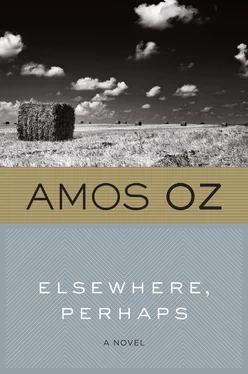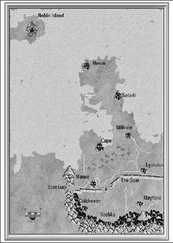Amos Oz - Elsewhere, Perhaps
Здесь есть возможность читать онлайн «Amos Oz - Elsewhere, Perhaps» весь текст электронной книги совершенно бесплатно (целиком полную версию без сокращений). В некоторых случаях можно слушать аудио, скачать через торрент в формате fb2 и присутствует краткое содержание. Год выпуска: 1985, Издательство: Mariner Books, Жанр: Современная проза, на английском языке. Описание произведения, (предисловие) а так же отзывы посетителей доступны на портале библиотеки ЛибКат.
- Название:Elsewhere, Perhaps
- Автор:
- Издательство:Mariner Books
- Жанр:
- Год:1985
- ISBN:нет данных
- Рейтинг книги:4 / 5. Голосов: 1
-
Избранное:Добавить в избранное
- Отзывы:
-
Ваша оценка:
- 80
- 1
- 2
- 3
- 4
- 5
Elsewhere, Perhaps: краткое содержание, описание и аннотация
Предлагаем к чтению аннотацию, описание, краткое содержание или предисловие (зависит от того, что написал сам автор книги «Elsewhere, Perhaps»). Если вы не нашли необходимую информацию о книге — напишите в комментариях, мы постараемся отыскать её.
Elsewhere, Perhaps — читать онлайн бесплатно полную книгу (весь текст) целиком
Ниже представлен текст книги, разбитый по страницам. Система сохранения места последней прочитанной страницы, позволяет с удобством читать онлайн бесплатно книгу «Elsewhere, Perhaps», без необходимости каждый раз заново искать на чём Вы остановились. Поставьте закладку, и сможете в любой момент перейти на страницу, на которой закончили чтение.
Интервал:
Закладка:
"Ezra."
"Yes. I'm listening."
"Don't you get bored, driving all the time? I suppose…"
"No. Not at all. I always think when I'm driving. Let us follow our thoughts, as the Prophet says. Thinking isn't only the prerogative of poets."
"Inner life," Reuven said enthusiastically. "True wealth consists in having a rich inner life, that's what I say."
"That's right. The wise man has eyes in his head, as the Bible says. I'm not a wise man, but I do know how to think. If you think the same thought a hundred times, it ends up by being very refined."
"It can lead to melancholy," said Reuven vaguely.
"It can lead to anything. But if you think systematically, it always leads to the same thing."
Reuven cast an anxious glance in his direction. What is he getting at? Not that. He shouldn't have said anything. Not that.
"One thing and one thing alone: that we're not getting any younger, Harismann, you, me, the others. The best part of our journey's behind us. You understand what I'm talking about. We all have to die some time. When we were young, we used to think that one dies only once, and that one should die gloriously, as they say. Now we've reached the age. You remember how Ramigolski went? He was a good friend of mine, but I think we've made a kind of false saint of him. I know they say never speak ill of the dead, and all that, but we've come to celebrate his death like a carnival, as if it was good that someone should have died early on, good from an educational point of view, as it were, do you understand — are you asleep? No? Well, at our age, we must realize one fact: the important thing isn't to die gloriously, it's to die as late as possible. Another ten years, another twenty years. My father was already dead when he was my age. So what? So it means I've gained something. 'It is better for me to die than to live,' 'would God I had died for you.' Those verses may be allegorical or something, it's not my field, but they're not true. Am I right, Harismann?"
"Let me explain," Reuven began, but stopped when Ezra laid a heavy hand on his knee.
"Wait. I haven't finished what I was saying. Yesterday, at the Megiddo turning, I saw a shocking accident. You see terrible things every day on the roads."
Reuven bit his lip and said nothing.
"Are you tired? Do you want to have a nap? Wait. I'll tell you. On the hill going down to the turning for Megiddo there was a truck parked, with a long load of iron rods. Those rods they use on reinforced concrete buildings. Apparently the driver was sitting having a rest. Up comes a giant semitrailer, knocks into the back of him, and pushes the rods through the rear window of the cab. Spitted him like skewered meat. Through the neck. He didn't have a chance. So you can get killed even without doing anything wrong. That's what really shakes you, when you suddenly see how fragile we are. It's terrible."
"Terrible," echoed Reuven. Ezra went on talking, strangely, compulsively.
"Now, listen. Sometimes at night you're dazzled by someone's headlights. You drive by instinct. You can't see anything. You're entirely dependent on your instinct. Now tell me this, think carefully and tell me: What is instinct? What is it? It's something capricious, something irrational, completely mysterious. And don't forget: you can't see anything at all with your eyes. You're blinded. Are you asleep, Harismann? No? Still listening? Blinded. Smite this people with blindness. For a few seconds you're entirely dependent on your instinct. If it lets you down, you'll die blinded. Then you'll find out just how fragile you are. Like losing in a lottery. Like… like tearing paper. Like water."
"Tell me, Ezra, do you think…"
"But it's not just when you're dazzled, not just when you see a fatal road accident. You find yourself thinking that kind of thought any time, for no apparent reason. When you see a skeleton, all bare and white, in a film, you're scared, aren't you? Yes, of course you are. But a skeleton just like that goes with you everywhere. Do you want to have a drink of coffee from the thermos? No? When you eat, when you write, when you laugh, even when you shop, there's always a white skeleton with you, with white ribs, with a skull and teeth and gaping sockets instead of eyes, as in all the pictures. When you have a woman, for instance, it's really just two skeletons grinding together. And if you can't hear the terrible noise which would turn the whole thing into a macabre joke, that's just because there's still a soft layer in between. But it's only temporary, Harismann, it's perishable, it's made of a moist substance that rots easily. It's a very frail wrapping, do you see. You're probably half asleep, aren't you? I just wanted to say that we're very fragile. Amazingly so. If only… at least… But what's come over me? You're tired, and I'm talking on and on. I'm sure everything I've been saying is written in books. I've probably tired you terribly. 'Speech is silver, silence is golden,' as they say. You can go to sleep now. We've got another hour and a half's drive ahead of us. You're very tired. You're worn out. I want you to sleep. Sleep. I promise not to drive the truck down the mountainside. Sleep peacefully. I'm not carrying iron rods this time. You can rest assured, as they say. Yes."
14. MOUNTING EVIDENCE
During the days preceding the festival, gossip reached fever pitch. If the signs were to be believed, something very strange and disturbing had happened in our kibbutz. One night Israel Tsitron, who was on duty as night watchman, overheard a quarrel. From him we learned that all was not well between Noga and her boy friend, the widow's son, Rami. This was confirmed by the evidence of Dafna Isarov, even if there were some who disputed the details of her disturbing story. According to Dafna, one evening, one Friday night, Rami Rimon had burst into the room that she and Noga shared and attacked Noga by main force. Later, Ezra Berger had appeared and had clashed with Rami, at first with words but later with blows. Eventually, Rami had burst out of the room, looking, Dafna said, very strange. A strange friendship had certainly come into being — so testified the widow Fruma Rominov, between Reuven Harish's daughter and Bronka's husband.
Of course. Now that this news has come to our notice, we connect it with what we have seen with our own eyes but not thought much about. For some days now we have observed the man and the girl chatting together in the early afternoon by the motor shed. Up to now we have seen nothing wrong in these conversations. If the rumors are true, we have been very naive. It is alleged that Ezra Berger buys his little friend embroidery thread over and above the kibbutz ration and pays for it out of his own pocket. In return, the girl has made him an embroidered bag for his sandwiches. Nina Goldring, who supplies the sandwiches, has seen the bag with her own eyes. It has a bear embroidered on it.
Is it right or proper for the two of them to meet in broad daylight in the middle of the yard, in the shadow of the huge truck, and for the older man to finger the girl's chin and mutter his pointless proverbs to her? Is it right for her to respond with musical laughter, and even slap him on his hairy shoulder? No, it's not right, it's not proper, it smacks of licentiousness.
If we are to believe Dafna, things have gone even further. Noga has got into the habit of getting up in the middle of the night and stealing across to the shed behind the laundry building to meet the driver on his return. Admittedly, Dafna is suspected of exaggerating. It would only be natural. But there is no denying that the affair has gone too far. There is more to it than meets the eye. We are cautious in our judgment. We base our opinion not on Dafna's evidence, which is not universally accepted, but on that of Mundek Zohar, who is a reliable witness. His evidence is decisive, and we shall record it presently. Of Noga Harish it was said that her mother Eva's hot blood flowed in her veins. Of Ezra Berger, Herzl Goldring said, "Is it any wonder that his Oren is a delinquent? The apple never falls far from the tree." There were some (Fruma Rominov seems to have been the first to voice this alarming idea) who said that this was Ezra's way of having his revenge. And so on.
Читать дальшеИнтервал:
Закладка:
Похожие книги на «Elsewhere, Perhaps»
Представляем Вашему вниманию похожие книги на «Elsewhere, Perhaps» списком для выбора. Мы отобрали схожую по названию и смыслу литературу в надежде предоставить читателям больше вариантов отыскать новые, интересные, ещё непрочитанные произведения.
Обсуждение, отзывы о книге «Elsewhere, Perhaps» и просто собственные мнения читателей. Оставьте ваши комментарии, напишите, что Вы думаете о произведении, его смысле или главных героях. Укажите что конкретно понравилось, а что нет, и почему Вы так считаете.












